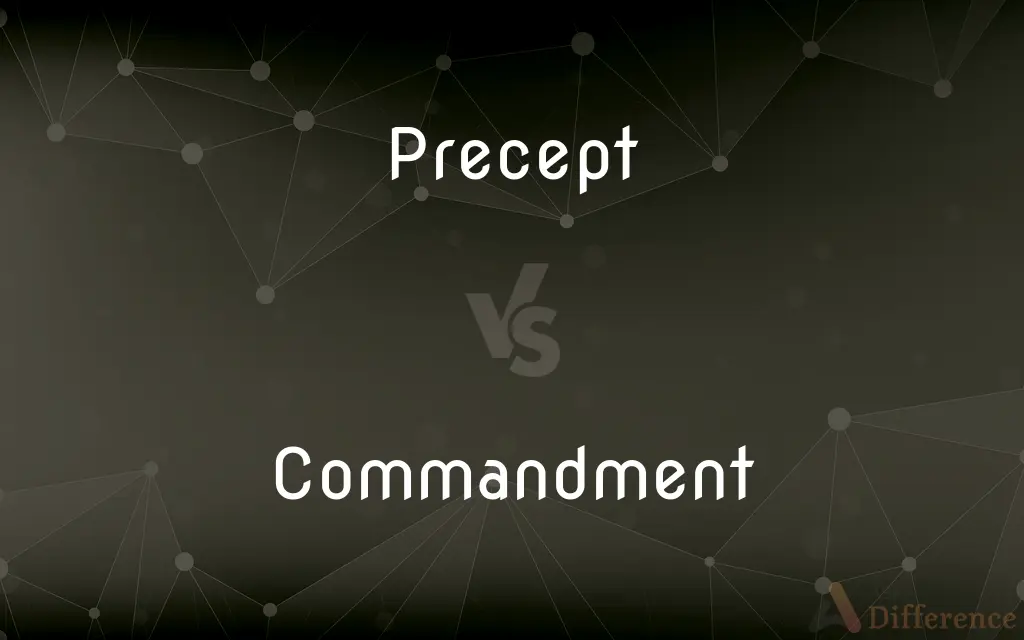Precept vs. Commandment — What's the Difference?
Edited by Tayyaba Rehman — By Urooj Arif — Updated on March 18, 2024
A precept is a general rule intended to regulate behavior or thought, often advisory in nature, while a commandment is a more authoritative directive, usually with religious or moral grounding.

Difference Between Precept and Commandment
Table of Contents
ADVERTISEMENT
Key Differences
Precepts are guidelines or principles designed to influence conduct, typically suggesting a course of action or a standard to follow. They can be found in various contexts, from ethical philosophies to legal systems, and often serve as broad recommendations rather than strict rules. Commandments, however, carry a stronger connotation of authority and obligation, often derived from a divine or sovereign source. They are most commonly associated with religious doctrines, such as the Ten Commandments in Christianity and Judaism, where they are seen as direct instructions from a higher power.
While precepts offer general guidance, allowing for interpretation and flexibility based on individual circumstances, commandments are more prescriptive, demanding adherence and often accompanied by consequences for disobedience. This distinction reflects the broader, more adaptable nature of precepts, which can apply to a wide range of situations and encourage thoughtful application, versus the more fixed and non-negotiable demands of commandments.
The source of precepts can vary widely, from philosophical thinkers and educational institutions to societal norms, whereas commandments are typically rooted in religious texts and traditions, underscoring their more absolute and transcendent origins. This difference highlights the role of precepts in fostering moral reasoning and ethical deliberation, as opposed to commandments, which are followed as a matter of faith and devotion.
In practical terms, adhering to precepts involves personal judgment and ethical consideration, where individuals reflect on the principles and how they apply to their lives. Following commandments, however, is more about obedience to an external authority, with less emphasis on personal interpretation. This dynamic illustrates the complementary nature of precepts and commandments in guiding human behavior, with precepts encouraging internal moral development and commandments providing clear, external standards.
Comparison Chart
Nature
Advisory guideline
Authoritative directive
ADVERTISEMENT
Flexibility
Open to interpretation
Fixed and non-negotiable
Source
Philosophical, educational, societal
Religious, divine
Purpose
To influence thought and behavior
To demand adherence
Application
Encourages personal judgment
Requires obedience
Contexts
Ethical philosophies, legal systems
Religious doctrines, moral codes
Examples
"Treat others as you wish to be treated."
"Thou shalt not steal."
Consequences
Generally social or personal
Often religious or moral
Compare with Definitions
Precept
A guideline or principle directing conduct.
The precept of fairness is fundamental in the legal profession.
Commandment
A mandate with moral or religious significance.
The commandment to love one's neighbor as oneself transcends many cultures.
Precept
A foundational concept in philosophies or doctrines.
Non-violence is a key precept in many world religions.
Commandment
An authoritative order or injunction.
The king's commandments were absolute within his realm.
Precept
An advisory rule for action.
Following the precept of empathy can enhance personal relationships.
Commandment
A directive with potential consequences for disobedience.
Breaking a commandment can have spiritual ramifications in many faiths.
Precept
A principle guiding moral judgment.
The precept of honesty underpins many ethical systems.
Commandment
A divine rule especially in religious contexts.
The Ten Commandments are central to Christian and Jewish moral teachings.
Precept
A broad recommendation for behavior.
Environmental conservation precepts encourage sustainable living.
Commandment
A rule intended for strict adherence.
The commandment not to lie is seen as a cornerstone of trust.
Precept
A precept (from the Latin: præcipere, to teach) is a commandment, instruction, or order intended as an authoritative rule of action.
Commandment
A command; an edict.
Precept
A general rule intended to regulate behaviour or thought
The legal precept of being innocent until proven guilty
Children learn far more by example than by precept
Commandment
(Bible) One of the Ten Commandments.
Precept
A writ or warrant
The Commissioner issued precepts requiring the companies to provide information
Commandment
(religion) A divinely ordained command, especially one of the Ten Commandments.
Precept
An order issued by one local authority to another specifying the rate of tax to be charged on its behalf
The precept required a supplementary rate of 6.1p in the pound
Commandment
(archaic) Something that must be obeyed; a command or edict.
Precept
A rule or principle prescribing a particular course of action or conduct.
Commandment
(law) The offence of commanding or inducing another to violate the law.
Precept
(Law) A direction or order issued by an authority; a writ, command, or process.
Commandment
(obsolete) The act of commanding; exercise of authority.
Precept
A rule or principle, especially one governing personal conduct.
Precept guides, but example draws.
Commandment
An order or injunction given by authority; a command; a charge; a precept; a mandate.
A new commandment I give unto you, that ye love one another.
Precept
(legal) A written command, especially a demand for payment.
Commandment
One of the ten laws or precepts given by God to the Israelites at Mount Sinai.
Precept
(UK) An order issued by one local authority to another specifying the rate of tax to be charged on its behalf.
Commandment
The act of commanding; exercise of authority.
And therefore put I on the countenanceOf stern commandment.
Precept
A rate or tax set by a precept.
Commandment
The offense of commanding or inducing another to violate the law.
Precept
To act as a preceptor; to teach a physician-in-training by supervising their clinical practice.
Commandment
Something that is commanded
Precept
To teach (something) by precepts.
Commandment
A doctrine that is taught;
The teachings of religion
He believed all the Christian precepts
Precept
Any commandment, instruction, or order intended as an authoritative rule of action; esp., a command respecting moral conduct; an injunction; a rule.
For precept must be upon precept.
No arts are without their precepts.
Precept
A command in writing; a species of writ or process.
Precept
To teach by precepts.
Precept
Rule of personal conduct
Precept
A doctrine that is taught;
The teachings of religion
He believed all the Christian precepts
Common Curiosities
What is a precept?
A precept is a general rule or guideline intended to influence or regulate behavior and thought, often serving as advisory or recommendatory in nature.
What is a commandment?
A commandment is an authoritative directive, often with religious or moral grounding, that demands obedience and adherence.
How do precepts differ from commandments?
Precepts are more advisory and open to interpretation, offering guidance, while commandments are authoritative, demanding compliance with little room for personal judgment.
Are commandments always religious?
While commonly associated with religious doctrines, the term commandment can also refer to any authoritative order or mandate, though its strongest connotations are religious.
How are precepts used in education?
In educational settings, precepts can serve as guiding principles for both academic conduct and personal development, encouraging students to develop critical thinking and ethical reasoning.
Do precepts allow for personal interpretation?
Yes, precepts are generally broader and allow for individual interpretation and application, depending on the context and circumstances.
Can precepts be found outside of religious contexts?
Yes, precepts can originate from various sources, including philosophical, educational, and societal norms, and are not limited to religious doctrines.
What role do commandments play in religious practices?
In religious contexts, commandments serve as fundamental rules or laws given by a deity, forming the core of moral and ethical conduct for adherents.
Can commandments change over time?
While commandments are typically seen as fixed and immutable, especially in religious contexts, interpretations and applications may evolve within different cultural or historical contexts.
Are there consequences for not following precepts?
Consequences for not adhering to precepts are generally more social or personal, reflecting on one's character or relationships, rather than the more defined religious or moral consequences of breaking commandments.
How do precepts and commandments influence moral behavior?
Precepts guide moral reasoning and ethical decision-making through principles, while commandments dictate specific actions or prohibitions, shaping moral behavior through adherence to set rules.
Share Your Discovery

Previous Comparison
Tired vs. Weary
Next Comparison
Dad vs. PapaAuthor Spotlight
Written by
Urooj ArifUrooj is a skilled content writer at Ask Difference, known for her exceptional ability to simplify complex topics into engaging and informative content. With a passion for research and a flair for clear, concise writing, she consistently delivers articles that resonate with our diverse audience.
Edited by
Tayyaba RehmanTayyaba Rehman is a distinguished writer, currently serving as a primary contributor to askdifference.com. As a researcher in semantics and etymology, Tayyaba's passion for the complexity of languages and their distinctions has found a perfect home on the platform. Tayyaba delves into the intricacies of language, distinguishing between commonly confused words and phrases, thereby providing clarity for readers worldwide.














































